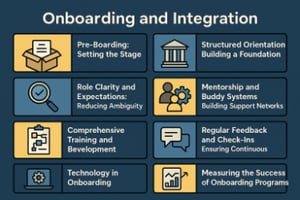Which Skills to Prioritise in Upskilling Initiatives?

Designing an effective upskilling program requires a strategic approach to skill prioritisation that aligns with current and future business needs. As industries evolve in response to technological advancements, globalisation, and changing market dynamics, organisations must focus on developing a balanced mix of technical, leadership, and soft skills to stay competitive and ensure long-term success. Below is an expanded guide on which skills to prioritise (as at the time of writing) categorised into eight key areas, along with best practices for successful implementation.
Digital and Technology Skills
Why They Matter:
The rapid pace of digital transformation means that technology skills are some of the most critical for maintaining competitiveness. Organisations across industries need to continuously enhance digital literacy to adopt new tools, optimise operations, and drive innovation.
Key Areas to Focus On:
Data Analytics:
- Why Prioritise? In a data-driven world, the ability to gather, analyse, and derive actionable insights from data is crucial.
- Skills to Build: Excel, SQL, Tableau, Python, R, and Power BI.
- Implementation Strategy: Offer tiered training based on roles, from foundational data literacy for non-technical staff to advanced analytics for data scientists and strategists.
Cybersecurity:
- Why Prioritise? As the number of cyber threats grows, cybersecurity skills are essential for safeguarding sensitive business and customer data.
- Skills to Build: Basic cybersecurity awareness for all employees; advanced skills in network security, ethical hacking, and compliance for technical roles.
- Implementation Strategy: Provide mandatory cybersecurity awareness training for all employees and specialised certification programs (e.g. CompTIA Security+, CISSP, SFIA) for IT professionals.
AI and Machine Learning:
- Why Prioritise? AI and ML are transforming industries by automating processes, enhancing decision-making, and creating new business opportunities.
- Skills to Build: Python, TensorFlow, Keras, and machine learning model development.
- Implementation Strategy: Incorporate AI and ML learning paths for roles in data science, product development, and strategy.
Cloud Computing:
- Why Prioritise? As more organisations migrate to the cloud, skills in cloud platforms are critical for system administration, development, and security.
- Skills to Build: AWS, Google Cloud, and Microsoft Azure certifications.
- Implementation Strategy: Create certification tracks for cloud-based roles and encourage cross-functional teams to complete foundational cloud training.
Software Development and Automation:
- Why Prioritise? Software development and automation drive digital transformation, making these skills key for developing new applications and automating repetitive tasks.
- Skills to Build: Programming languages like Java, Python, JavaScript, and automation tools like Selenium.
- Implementation Strategy: Offer coding bootcamps for beginners and advanced courses for seasoned developers.
Adaptability and Continuous Learning
Why They Matter:
Adaptability and a commitment to lifelong learning are critical for employees to navigate the rapidly changing business landscape. These skills empower teams to remain resilient and innovative in the face of disruption.
Key Areas to Focus On:
Agility and Adaptability:
- Why Prioritise? Agility enables employees to pivot quickly and effectively in response to changes in the business environment.
- Skills to Build: Agile methodologies (Scrum, Kanban), flexibility, and change management.
- Implementation Strategy: Incorporate experiential learning opportunities, such as simulations and role-playing scenarios.
Learning Agility:
- Why Prioritise? Employees with high learning agility can quickly acquire new skills and knowledge, making them invaluable in a dynamic environment.
- Skills to Build: Rapid skill acquisition, open-mindedness, and curiosity.
- Implementation Strategy: Encourage self-directed learning and provide access to microlearning platforms for continuous upskilling.
Problem-Solving Skills:
- Why Prioritise? Creative problem-solving is essential for addressing complex business challenges and driving innovation.
- Skills to Build: Critical thinking, analytical reasoning, and design thinking.
- Implementation Strategy: Use problem-solving workshops and hackathons to engage employees in real-world scenarios.
Leadership and Management Skills
Why They Matter:
Strong leadership capabilities are critical for guiding teams through change, driving strategy, and building a high-performance culture. Developing these skills ensures that the organisation has a pipeline of future-ready leaders.
Key Areas to Focus On:
Emotional Intelligence (EQ):
- Why Prioritise? EQ is foundational for building strong interpersonal relationships and leading teams effectively.
- Skills to Build: Empathy, self-regulation, and conflict resolution.
- Implementation Strategy: Use 360-degree feedback, role-playing exercises, and EQ assessments to develop these skills.
Change Management:
- Why Prioritise? Effective change management ensures smooth transitions during organisational shifts, such as digital transformation or restructuring.
- Skills to Build: Communication, stakeholder management, and project planning.
- Implementation Strategy: Offer formal change management certifications (e.g. Prosci) and scenario-based training.
Decision-Making and Strategic Thinking:
- Why Prioritise? Leaders need to make informed, strategic decisions in complex and uncertain environments.
- Skills to Build: Data-driven decision-making, long-term planning, and risk management.
- Implementation Strategy: Use case studies and simulations to build decision-making skills in real-world contexts.
Coaching and Mentoring:
- Why Prioritise? Strong coaching and mentoring capabilities enable leaders to develop their teams and create a culture of continuous growth.
- Skills to Build: Active listening, feedback delivery, and developmental planning.
- Implementation Strategy: Create a formal mentorship program and train managers on effective coaching techniques.
Communication and Collaboration Skills
Why They Matter:
With more teams working remotely or in hybrid environments, effective communication and collaboration are essential for maintaining productivity and building strong team dynamics.
Key Areas to Focus On:
Effective Communication:
- Why Prioritise? Clear, concise communication reduces misunderstandings and improves efficiency in remote or cross-functional teams.
- Skills to Build: Public speaking, written communication, and active listening.
- Implementation Strategy: Offer communication workshops, writing labs, and presentation coaching.
Collaboration Tools:
- Why Prioritise? Proficiency in collaboration tools is essential for effective teamwork, especially in remote or hybrid settings.
- Skills to Build: Slack, Microsoft Teams, Zoom, and project management tools (Asana, Trello).
- Implementation Strategy: Offer tutorials and role-specific training for collaboration tools used within the organisation.
Cross-Functional Collaboration:
- Why Prioritise? Cross-functional teams are essential for tackling complex business challenges that require diverse skill sets.
- Skills to Build: Negotiation, consensus-building, and project coordination.
- Implementation Strategy: Use cross-functional projects and team-building exercises to build these skills.
Customer-Centric Skills
Why They Matter:
Understanding and exceeding customer expectations is a key driver of business success. Employees equipped with customer-centric skills can enhance customer satisfaction, loyalty, and revenue growth.
Key Areas to Focus On:
Customer Experience (CX) Management / Service Design:
- Why Prioritise? Excellent customer experience leads to higher retention and positive word-of-mouth.
- Skills to Build: Customer journey mapping, empathy mapping, and service design.
- Implementation Strategy: Use role-playing scenarios and case studies to build CX management skills.
User Experience (UX) Design:
- Why Prioritise? For product teams UX design enhances product usability and customer satisfaction.
- Skills to Build: Design thinking, prototyping, and usability testing.
- Implementation Strategy: Use design workshops and hands-on projects to teach UX design principles.
Sales and Negotiation:
- Why Prioritise? Strong sales and negotiation skills are essential for building long-term customer relationships.
- Skills to Build: Consultative selling, persuasive communication, and relationship management.
- Implementation Strategy: Offer sales bootcamps, negotiation simulations, and one-on-one coaching.
A Balanced Approach to Upskilling
When deciding which skills to prioritise in your upskilling strategy, focus on a balanced mix of digital, soft, and leadership skills. By targeting digital and technical skills, adaptability, communication, and customer-centric capabilities, you ensure your workforce is well-prepared to drive organisational success in a rapidly changing business environment. Implement structured learning paths, use real-world applications, and foster a culture of continuous improvement to create a future-ready workforce that thrives in complexity.



